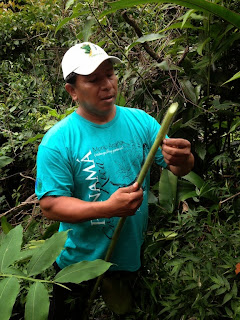At home, there was one place I feared most, more than a closet or a space under the bed full of monsters. That place was the medicine cabinet. Along with the Tylenol, Dayquil, and gummy vitamins, my family kept our stock of traditional Chinese medicine, full of dried herbs and pungent dark syrups. They smelled bad and tasted worse. In my family the first line of care is to drink lots of water with honey, of which I was a big fan. But on the rare occasions I had a sore throat that just wouldn't quit or that one memorable summer when I got pneumonia, I had to force down a nasty spoonful with many assurances that yes, it works, so don't spit it up. I have always been proud of my Chinese heritage and its influence on my life. But when it comes to its medicine, I remained a skeptic.
4,000 miles away from that medicine cabinet, Sebastian, our guide through the forests of Kekoldi and indigenous Bribri knowledge, highlighted many medicinal plants in the lush green surrounding forest. We clambered up hills, stood in the shadows of 700 year old trees, and waded through creeks, all the while scribbling notes on the many medicinal plants that surrounded us. Some were universal, like ginger to help with stomachaches. But other plants were entirely new. Thanks to local Bribri knowledge, we tasted the sharp bite of sourcane, admired the hombre grande for its awesomeness as a natural mosquito repellant, took pictures of the pastora de montagna which helped with arthritis and many many more.
Among the many things Sebastian told us that day, one adage stuck with me the most: the worst tasting plants make the body stronger. What I was hearing in Spanish I had only previously heard in Chinese, a saying that had withstood the test of time, repeated around the world, from Costa Rica to my home in California and my roots in China. After plunging into the tropical rainforests of Costa Rica on strenuous, educational hikes and doing community outreach, it took traveling all this way for me to realize something that was in my life all along: sometimes biomedicine is not the only answer. In fact medicine stretches far beyond measurable observations. Medicine is also a personal choice integrated into our cultural belief systems. I am learning more than I ever anticipated about not only the culture of Costa Rican health care but also my medicinal culture, using both culture and biology based medicine. And finally, the worst tasting medicine can help more than anything else.
Emily Y.
Emily Y.


No comments:
Post a Comment